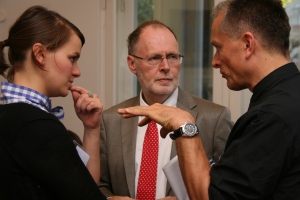If people think of dialogue, they often imagine the original form of dialogue where participants sit in a circle and open up to meaningful conversation with each other. The purpose of such format often is to slow down communication, so that words and their meaning can listened to, but also the space between the words gets attention.
People who have experienced open dialogue sometimes report an impactful experience: new insights occur, their positions shifted, their judgments about other people changed, or they saw new paths opening during the conversation. It is important to keep the original purpose of dialogue in mind: enhancing people’s ability to see the larger picture of a situation, so to say ‘the whole’, more easily as a result of genuine interest in each other’s thought process.
“It is clear if we are to live in harmony with ourselves and with nature we need to be able to communicate freely in a creative movement in which no one permanently holds to or otherwise defends his own ideas… When we come together to talk, or otherwise to act in common, can each of us be aware of the subtle fears and pleasure sensations that block his ability to listen freely?Without this awareness, the injunction to listen to the whole of what is said will have little meaning. But if each one of us can give full attention to what is actually blocking communication while he is also attending properly to the content of what is communicated, then we ma be able to create something new between us, something of very great significance for bringing to an end the at present insoluble problems of the individual and society.”
(By David Bohm, 1996)
Stakeholder Dialogues will rarely be conducted as circles of freely flowing conversations. Most often, they require a more structured setting, a protocol determined by the participating stakeholder groups, and time pressure to achieve results. But they are based on the same premises as all ancient forms of dialogue: the assumption that creative evolutionary processes require a continuous exchange of vie, ideas and possible ways forward. Only this leads to the emergence of collective intelligence.
This is taken from our book Working with Stakeholder Dialogues: Key Concepts and Competencies for Achieving Common Goals – a practical guide for change agents from public sector, private sector and civil society (April 2011)

